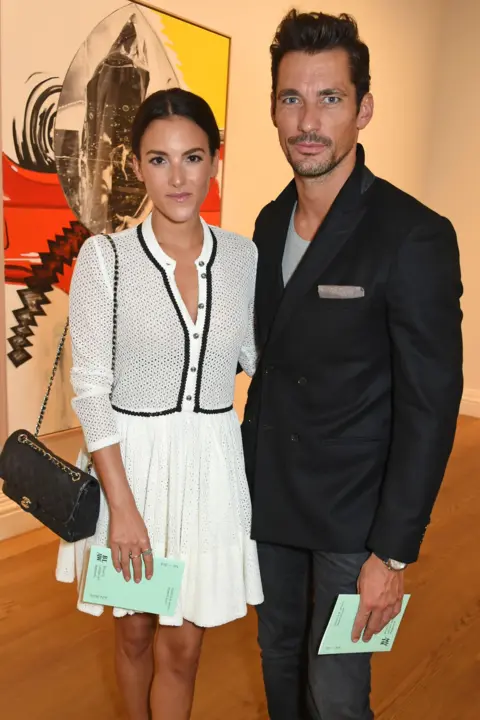 BBC
BBCDavid Gandy is relaxed. The Essex-born supermodel is sitting in his light-filled kitchen, sipping a glass of water and reflecting on his almost 25-year career.
At 45, Gandy’s striking dark brown hair, sharp cheekbones and piercing blue eyes have been at the centre of some of fashion’s most iconic campaigns of the last two decades, and he is one of the few male models to become a household name.
“I always say that I was inspired by the female supermodels,” Gandy says, name-checking Cindy Crawford, Kate Moss and Naomi Campbell. “You don’t even need to say the surnames.
“It’s not like I’ve ever got to that status,” he laughs.
‘We’re now seeing campaigns where the model doesn’t even exist’
It was Gandy’s contract with Dolce & Gabbana that catapulted his career, with the model fronting a campaign for the brand’s Light Blue fragrance line – to this day, arguably his most notable work.
It began with an advert in which Gandy stands at the helm of a boat bobbing about a cove near Capri, Italy, wearing only a pair of white trunks. His hair is slicked back, as he leans into an embrace with model Marija Vujović. Gandy remained the face of the brand for an impressive 18 years.
He tells me the Light Blue campaign gave him a platform to approach the level of his female counterparts. “They were paid so much more than us – rightly so. I just wanted to even things up a little bit,” he says with a chuckle.
 Alamy
AlamyGandy spoke to BBC News ahead of London Fashion Week, which continues this weekend, and was keen to discuss what he sees as an existential threat to the fashion industry from artificial intelligence (AI).
It comes as more than 2,000 professional models, including Gandy, Twiggy and Yasmin Le Bon, call on the government to protect people’s rights when generative AI can be used to create human-like images in a matter of seconds.
“We’re now seeing campaigns created by the likes of Guess and other brands where the model doesn’t exist at all,” Gandy says. “Whether that is AI learning – they call it scraping – little bits of imagery from different models and different people, and creating that into an image, is one of the grey areas and the problems.”
 Seraphinne Vallora
Seraphinne ValloraGandy fears that without further regulation, the use of AI models could irreparably damage the industry.
“Britain produces some of the greatest models,” he says, “and we want to keep that tradition going.”
It’s not only the impact on models Gandy is concerned about, but also on those involved in the making of fashion imagery – including photographers.
“The idea that you’re taking away this artistry from people,” he explains. “The hairdressers, the make-up artists, lots of assistants, even the location itself. You’re making that whole element redundant.”
‘I’ve always split my private life and my business life’
As the father of two young daughters, Gandy says he worries too about the effect of AI-generated imagery on mental health, particularly among young people.
“Looking at something that isn’t even real – where the person doesn’t exist – we don’t yet know the impact of that yet,” he says.
Gandy acknowledges that the fashion industry will inevitably need to embrace AI in some ways, but stresses, “There has to be regulation”.
For many, supermodel status can mean your personal life is as well-known as your work in fashion. But from his home near London’s Richmond Park – which he shares with his partner Stephanie Mendoros, his daughters, and their rescue dog, Dora – Gandy tells me he guards his privacy fiercely. On our visit, he is careful to shield the pictures of his family dotted around the house.
“I’ve always split my private life and my business life,” he says. “They’re two separate things. No one knows what my children look like; there are no images of them online. And I won’t be posting what I had for breakfast!”
Conversation swiftly turns to his garden. “I think you get to an age, I’m not sure if it’s about 40 years old, but some men become obsessed with their lawn,” he says, something he jokingly admits hasn’t benefited from having a bouncy castle on it all summer.
He tells me his daughters like to dress him up, too. “They’ve put hair bands on me that have bunny ears and bear ears, and I’ve forgotten that I’ve been wearing them,” he recalls, “So then I’ve gone shopping with them on.”
“I’ve come back and my partner has said to me, ‘You know you’ve got bunny ears on?'”
Gandy shakes his head, laughing.
 Getty Images
Getty ImagesSome of his children’s friends now recognise him from adverts, he tells me, but despite being such a well-known face, Gandy says he doesn’t often get recognised in the street.
“I’ve had people standing in front of the big posters and telling me, ‘I recognise you from somewhere’, when the poster is behind them,” he laughs gently, adding that he never worries about setting anyone straight.
“I always say I have quite a nice level of fame,” Gandy says. “Ninety-nine per cent of people are very polite when they come up to me and have a conversation.”
A government spokesperson said:
“Fast-moving technologies like AI bring huge opportunities and also complex challenges. We know some individuals are concerned about their ability to protect their likeness.
“UK law already offers some protection for aspects of a person’s identity, and we continue to seek views on how they are working and if any changes may be needed.”
Guess was approached for comment.

